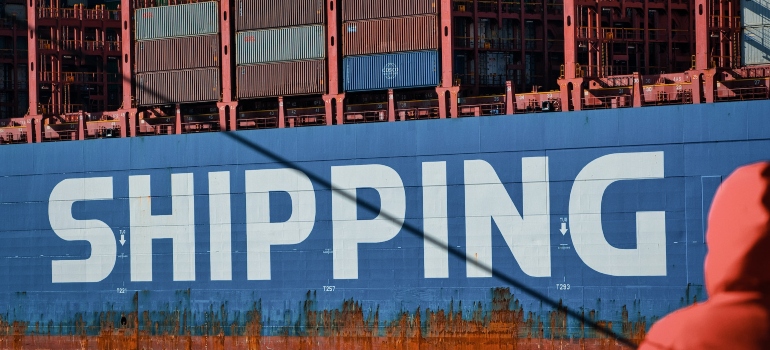In today’s globalized world, understanding international shipping and customs is crucial for businesses and individuals. With the rise of e-commerce and global supply chains, the movement of goods across borders has become an important yet complex operation. Recognizing this, Verified Movers offers insights into the essentials of this process. This guide delves into the key aspects of international shipping and customs, ensuring you have the necessary knowledge to navigate this vital field successfully.
Understanding International Shipping
International shipping is a vast network connecting countries and continents. It involves transporting goods through various modes, including:
- Air
- Sea and
- Land
Each mode has its own set of advantages and challenges. For instance, air freight is faster but often more expensive than sea transport, which is ideal for bulkier shipments despite longer transit times.

In this complex landscape, several key players ensure smooth operations. Carriers are responsible for transporting the goods. Freight forwarders act as intermediaries, handling logistics and often providing valuable advice on the best shipping methods. Customs brokers specialize in navigating the maze of customs regulations, a critical aspect of international shipping.
Documentation is the backbone of international shipping. A commercial invoice, bill of lading, and export packing list are just a few essential documents. Each plays a vital role. The commercial invoice provides a detailed account of the transaction. The bill of lading serves as a contract between the owner of the goods and the carrier. Meanwhile, the export packing list details the contents of the shipment. These documents ensure compliance and facilitate the smooth movement of goods across borders.
Customs Basics
At the heart of international shipping and customs is the customs process itself. It’s here where goods are assessed, duties and taxes determined, and compliance with local laws ensured. The customs value of goods, crucial for determining duties and taxes, is based on the transaction value of the goods, their description, and classification under the Harmonized System (HS) code.
Understanding customs basics is more than a regulatory requirement; it’s a strategic business decision. The changes in customs regulations, particularly during events such as the pandemic effect on the supply chain in moving, highlight how these shifts can significantly impact global trade flows. Being knowledgeable in customs practices helps businesses adapt more effectively to such changes, ensuring smoother international operations.
Navigating Through Customs Regulations
In the realm of international shipping and customs, understanding customs regulations is crucial. Key to this is the Harmonized System (HS) code, a standardized numerical method of classifying traded products. These codes determine the tariff and duty rates for each item. Accurate classification is essential, as errors can lead to delays and additional costs. For instance, shipping and transportation innovations can reveal incorrect HS code classification, leading to significant fines for several companies.
Country-specific regulations and trade agreements also play an important role. For example, goods entering the European Union are subject to different regulations than those entering the United States. Moreover, trade agreements between countries can significantly influence tariff rates. Staying informed about these regulations and agreements can greatly smooth the process of international trade.
Prohibited and restricted items vary by country and can include anything from certain food products to specific types of electronics. Awareness of these restrictions is necessary to avoid shipment seizures or legal penalties.
The Shipping Process
The shipping process begins with proper preparation. Packaging and labeling must adhere to international standards to ensure the safety and security of the shipment. For instance, when shipping your belongings overseas and they are fragile items, they will require special packaging to prevent damage during transit.

Selecting the right shipping carrier and service is influenced by factors like cost, speed, and reliability. Businesses must balance these factors according to their specific needs. Tracking shipments is now easier thanks to technology, enabling both businesses and customers to stay updated on their shipment’s status in real-time.
Dealing with Customs Clearance
Customs clearance is a critical stage in international shipping. This is where the role of a customs broker becomes invaluable. These professionals have expertise in local customs regulations and can help expedite the clearance process. They can also assist in resolving any issues that might arise, such as missing documentation or payment of duties.
Delays in customs can occur for various reasons. Common causes include incomplete or incorrect documentation, unpaid duties, or random inspections. The advancements such as driverless trucks demonstrate how improvements in transportation technology, especially in automation, can reduce these delays by enhancing the accuracy in documentation and tracking.
To avoid customs delays, businesses should ensure all documentation is complete and accurate, duties and taxes are pre-calculated and paid, and shipments comply with local regulations. Regular communication with shipping carriers and customs brokers can also help identify and resolve issues quickly.
Innovations in Packaging for International Transport
Innovations in packaging play a crucial role in enhancing the efficiency and safety of international transport. Advancements in materials and design are revolutionizing how goods are protected during transit. For instance, biodegradable and recyclable materials are increasingly being used, reflecting a shift towards environmental sustainability. These materials not only reduce environmental impact but also cater to consumers’ growing eco-consciousness.
Smart packaging is another significant innovation. This includes the use of sensors and IoT (Internet of Things) technology to monitor conditions like temperature, humidity, and shocks during transit. Such technology is particularly crucial for sensitive goods like pharmaceuticals and perishable foods. Smart packaging helps ensure product integrity and can provide valuable data for optimizing shipping routes and methods.
Additionally, lightweight and durable packaging materials are being developed to reduce shipping costs and improve handling efficiency. These materials help lower fuel consumption in transport vehicles, contributing to reduced carbon emissions. Innovations in packaging are not just about protection and sustainability; they’re also about enhancing the overall efficiency of international shipping and customs processes.
Cultural Considerations in Global Trade
Understanding cultural differences is vital in international shipping and customs, impacting everything from negotiation styles to contract expectations. Cultural considerations influence how business is conducted across different countries. For example, in some cultures, building a personal relationship is essential before any business transaction, while in others, straight-to-the-point communication is preferred.

Language barriers, business etiquette, and local customs can also affect international trade. Misunderstandings due to language or cultural nuances can lead to delays and even failed deals. Hence, it’s important for businesses to be culturally sensitive and aware. This might involve using local experts, learning about cultural norms, or employing bilingual staff.
In addition, understanding national holidays and working days in different countries is crucial. For instance, a public holiday in one country could delay shipping schedules and affect the entire supply chain. By being mindful of these cultural aspects, businesses can build stronger international relationships, ensuring smoother transactions in international shipping and customs.
Technology in International Shipping and Customs
Technology has revolutionized international shipping and customs, enhancing efficiency and transparency. Digital tools and platforms now enable real-time tracking of shipments, providing both shippers and customers with up-to-date information on their goods. For instance, advanced GPS systems allow for precise tracking of cargo, reducing the chances of loss or delay.
Artificial Intelligence (AI) and blockchain are also emerging as influential technologies in this field. AI helps in predicting shipping patterns and optimizing routes, while blockchain increases security and transparency in transactions. This technology makes US customs procedures and many others faster and more reliable.
Insurance and Liability in International Shipping
Insurance plays a crucial role in international shipping and customs. It protects shippers and receivers against potential losses incurred during transport. Understanding the types of insurance available is essential. These include cargo insurance, liability insurance, and freight insurance. Cargo insurance covers damage or loss of goods, liability insurance protects against legal responsibilities, and freight insurance covers the loss of freight charges in case of undelivered goods.
Liability in international shipping can be complex. It involves understanding who is responsible at various stages of the shipping process. This includes issues related to damage, loss, or delays. International conventions, such as the Hague-Visby Rules, provide some guidance, but it’s important to have clear contracts that outline liability terms. For example, in a case where goods are damaged due to improper packaging, determining liability depends on the terms agreed upon in the shipping contract.
Environmental Impact and Sustainability in Shipping
The environmental impact of international shipping and customs is significant. Shipping contributes to air pollution and greenhouse gas emissions. Recognizing this, the industry is moving towards more sustainable practices. This includes using cleaner fuels, improving energy efficiency, and investing in eco-friendly technologies like electric ships.

Sustainability in shipping also involves reducing waste and improving supply chain practices. Companies are increasingly adopting strategies such as circular supply chains, where materials are reused and recycled, and optimizing routes to reduce fuel consumption. These efforts not only help the environment but can also lead to cost savings.
The Role of Customs Brokers: In-Depth
Customs brokers are vital in the process of international shipping and customs. They act as intermediaries between shippers and government customs departments. Their expertise lies in understanding complex customs regulations and ensuring compliance. This includes classifying goods correctly, preparing and submitting necessary documentation, and calculating duties and taxes.
A good customs broker can save a business time and money by avoiding delays at customs. They stay updated on changing regulations and trade agreements, providing valuable guidance. For instance, during the Brexit transition, customs brokers played a key role in helping businesses navigate new customs procedures between the UK and EU.
Impact of E-Commerce on International Shipping
E-commerce has dramatically transformed international shipping and customs. The rise in online shopping has led to an increase in cross-border shipments, both in volume and frequency. This shift has brought new challenges and opportunities. For one, it has increased the demand for faster and more reliable shipping options, prompting companies to innovate in logistics and delivery methods.
E-commerce has also led to a change in customs processes. With a higher volume of small parcels, customs authorities are adapting with more streamlined procedures and automated systems. Additionally, e-commerce platforms are increasingly partnering with logistics companies to manage the complexities of international shipping, from warehousing to customs clearance.
Future Trends in International Shipping and Customs
Looking ahead, several trends are set to shape the future of international shipping and customs. Automation in logistics, such as the use of drones for delivery, is likely to become more prevalent. Additionally, as environmental concerns grow, there will be a shift towards more sustainable shipping practices, such as the use of electric vehicles and ships.
The impact of global events, like the COVID 19 pandemic, has underscored the need for more resilient and adaptable supply chains. This realization is driving innovation in how goods are transported and managed across borders.
Tips and Best Practices in International Shipping and Customs
To navigate international shipping and customs effectively, it’s important to stay informed and be proactive. Keeping abreast of changes in regulations and leveraging technology can help avoid delays and extra costs. For example, understanding the process and the cost of international car shipping can provide valuable insights for those looking to ship vehicles overseas.

Building a reliable strategy for international shipping involves selecting the right partners, from carriers to customs brokers, and maintaining good communication throughout the shipping process. It’s also wise to have contingency plans in place to handle unexpected delays or issues.
Are you ready to make an informed decision about international shipping and customs?
International shipping and customs can be complex, but with the right knowledge and tools, it is manageable. By staying informed and adaptable, businesses and individuals can successfully navigate the intricacies of international trade, ensuring their goods move smoothly across borders.




